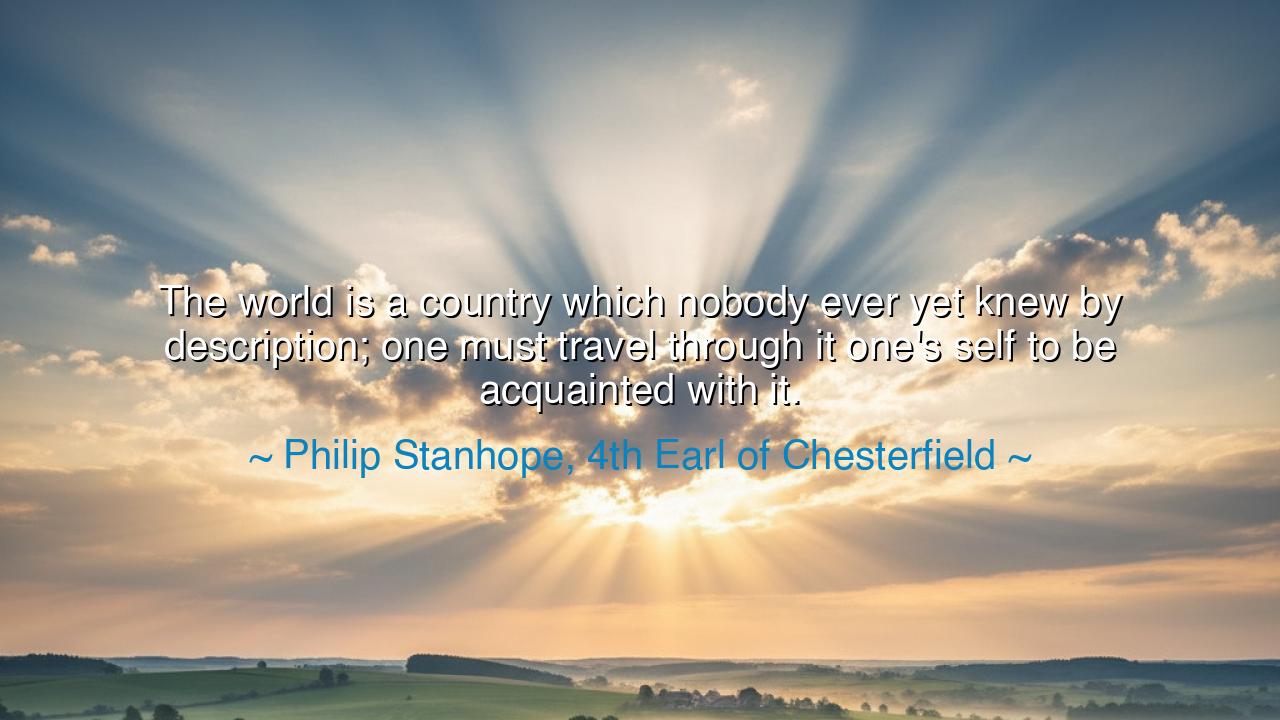
The world is a country which nobody ever yet knew by
The world is a country which nobody ever yet knew by description; one must travel through it one's self to be acquainted with it.






Hear the words of Philip Stanhope, the 4th Earl of Chesterfield, who declared: “The world is a country which nobody ever yet knew by description; one must travel through it one’s self to be acquainted with it.” Though spoken in the 18th century, this truth echoes with the voice of eternity, for it tells us that knowledge drawn from books, hearsay, and second-hand accounts is but a pale shadow of true understanding. To know the world is not to read of it—it is to walk upon its soil, to breathe its air, to look into the eyes of its people, and to let experience burn wisdom into one’s soul.
The country of the world is vast, and though maps may chart its mountains and seas, no parchment can convey the smell of spice in a market, the sound of prayer in a distant temple, or the feeling of salt wind against one’s face at the prow of a ship. Chesterfield reminds us that words and descriptions are lanterns, but the path itself must be trodden. He knew, as the ancients knew, that wisdom is not learned in cloisters alone, but in the roads, the ports, and the encounters with strangers who become teachers.
Consider the story of Herodotus, called the Father of History. He did not write his great accounts of Egypt, Persia, and Greece by remaining in his own city. He wandered, he asked, he observed. He listened to merchants, priests, and travelers. Though sometimes mocked for including strange tales, his work has endured because it was born not of description alone, but of travel, of direct encounter with the living world.
So too, think of Ibn Battuta, the Moroccan wanderer of the 14th century, who journeyed more than seventy-five thousand miles across Africa, the Middle East, and Asia. Had he remained at home, he might have heard stories of distant lands, but by setting out upon the road, he came to know their languages, their foods, their laws, their faiths. His record is precious to us not because it repeats hearsay, but because it carries the weight of his footsteps across deserts and seas. Truly, he was acquainted with the world, because he had lived in it beyond the borders of his own birthplace.
Chesterfield’s words also carry a deeper meaning: they are not only about geography, but about life itself. No man can be told what love truly is until he has felt it. No one can describe the bitterness of grief in a way that makes another fully know it. No teacher, no parent, no book can substitute for the journey each soul must take. To be acquainted with life is to walk through joy and sorrow, to taste victory and endure failure. Description prepares, but experience completes.
The lesson for us is clear: do not be content with second-hand knowledge. Read, yes, for books are the voices of the past—but do not let them be your only teachers. Step beyond the page, into the world itself. Travel when you can, even if only to the next village, for each road walked is a lesson no parchment can teach. Speak with those unlike yourself, listen to the stories of strangers, and let experience carve wisdom upon your heart.
Practically, this means: seek opportunities to broaden your horizons. If your means allow, journey across seas and continents; if not, explore your own land with new eyes. Engage with those of different faiths, different languages, different lives. For the country of the world is not only measured in miles but in encounters. And above all, when life itself brings trials, do not flee them, for they too are part of the travel by which you will be truly acquainted with the human condition.
Therefore, O children of tomorrow, remember Chesterfield’s wisdom. The world cannot be known by description—it must be lived, it must be walked, it must be touched. Do not mistake the shadow for the thing itself. Go forth, with courage and with curiosity, and let your own journey acquaint you with the richness of life. For in the end, it is not what you have read, but what you have lived, that makes you wise.






AAdministratorAdministrator
Welcome, honored guests. Please leave a comment, we will respond soon